

Are China and India converging? Both China and India have attracted global attention for rapid growth, but their growth patterns are very different (Rajan 2006, Pack 2008, Bosworth and Maertens 2010).
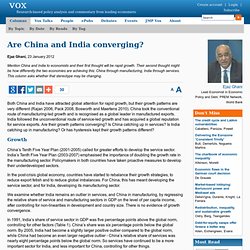
China took the conventional route of manufacturing-led growth and is recognised as a global leader in manufactured exports. India followed the unconventional route of service-led growth and has acquired a global reputation for service exports. Are their growth patterns converging? Is China's Economy Unraveling? If China’s Property Bubble Bursts.
The cooling of China’s real estate sector is good for the economy.
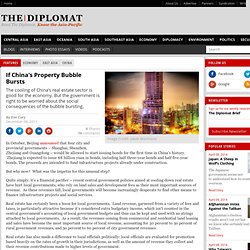
But the government is right to be worried about the social consequences of the bubble bursting. By Eve Cary for The Diplomat December 08, 2011 Facebook0 Twitter0 Google+0 LinkedIn0. Pivot Capital On China's Investment Boom (And Pending Bust) China’s Fall, Not Its Rise, Is the Real Global Threat: View. Oct. 4 (Bloomberg) -- China’s rise to global prominence has long preoccupied the leaders of the developed world.
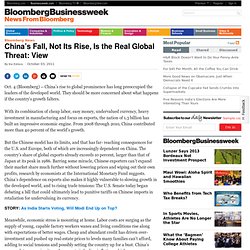
They should be more concerned about what happens if the country’s growth falters. With its combination of cheap labor, easy money, undervalued currency, heavy investment in manufacturing and focus on exports, the nation of 1.3 billion has built an impressive economic engine. China will spend where it can own. Economics focus: The celestial economy. China's slows but still grows, thanks to regional "gravity" Economist talking up a new book by Arvind Subramanian, who often writes for the FT.
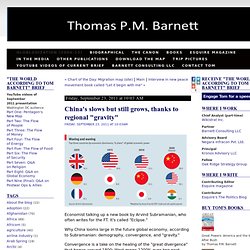
How Can China Save Europe When It's Defaulting On Its Own Debt? China’s capital flight - macrobusiness.com.au. China’s rivals gain as factory wages soar. China may be famous as the workshop of the world, but one Hong Kong lingerie- maker has found Thailand a more alluring destination, as companies shift production to cheaper countries.
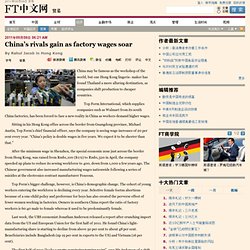
Top Form International, which supplies companies such as Walmart from its south China factories, has been forced to face a new reality in China as workers demand higher wages. Sitting in his Hong Kong office across the border from Guangdong province, Michael Austin, Top Form’s chief financial officer, says the company is seeing wage increases of 20 per cent every year. “China’s policy is double wages in five years. We expect it to be shorter than that.” After the minimum wage in Shenzhen, the special economic zone just across the border from Hong Kong, was raised from Rmb1,100 ($172) to Rmb1,320 in April, the company speeded up plans to reduce its sewing workforce to 400, down from 1,000 a few years ago. China’s Slowdown. Yesterday, China’s National Bureau of Statistics issued the official economic figures for the 3rd Quarter of 2011.
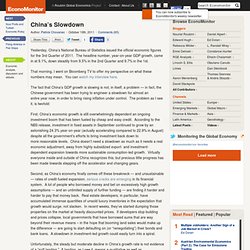
The headline number, year-on-year GDP growth, came in at 9.1%, down steadily from 9.5% in the 2nd Quarter and 9.7% in the 1st. That morning, I went on Bloomberg TV to offer my perspective on what these numbers may mean. You can watch my interview here. Bloomberg: China’s Slowdown. Yesterday, China’s National Bureau of Statistics issued the official economic figures for the 3rd Quarter of 2011.
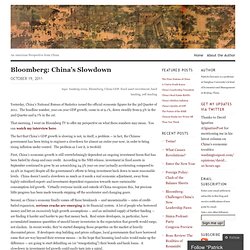
The headline number, year-on-year GDP growth, came in at 9.1%, down steadily from 9.5% in the 2nd Quarter and 9.7% in the 1st. That morning, I went on Bloomberg TV to offer my perspective on what these numbers may mean. You can watch my interview here. Sixty percent of China's rich want to leave the country. Swimming Naked in China. With the Chinese government tightening credit, the massive leakage from the formal banking sector into the ‘shadow system’ ultimately risks sinking the country’s financial system.
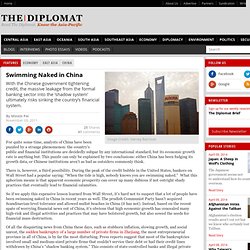
For quite some time, analysts of China have been puzzled by a strange phenomenon: the country’s public and financial institutions are decidedly subpar by any international standard, but its economic growth rate is anything but. This puzzle can only be explained by two conclusions: either China has been fudging its growth data, or Chinese institutions aren’t as bad as outsiders commonly think. There is, however, a third possibility. During the peak of the credit bubble in the United States, bankers on Wall Street had a popular saying: “When the tide is high, nobody knows you are swimming naked.”
What this aphorism means is that apparent economic prosperity can cover up many dubious if not outright shady practices that eventually lead to financial calamities. Sinocism-China In The 21st Century. Analysis: Is China left holding the credit baby? Michael Pettis: China's Economy Is Headed for a Slowdown. HEARD ON THE STREET: China's Wave of Overcapacity. Are We Prepared for a Multipolar World Economy? - Justin Yifu Lin and Mansoor Dailami. Exit from comment view mode.
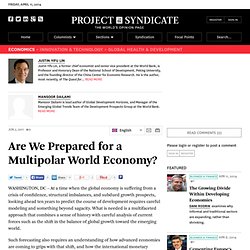
Click to hide this space WASHINGTON, DC – At a time when the global economy is suffering from a crisis of confidence, structural imbalances, and subdued growth prospects, looking ahead ten years to predict the course of development requires careful modeling and something beyond sagacity. What is needed is a multifaceted approach that combines a sense of history with careful analysis of current forces such as the shift in the balance of global growth toward the emerging world.
Such forecasting also requires an understanding of how advanced economies are coming to grips with that shift, and how the international monetary system will adjust as a result. Having studied these factors, we believe that the world economy is on the verge of a transformative change – the transition to a multipolar world economic order. This pattern is set to change. Broadly, this arrangement still holds today, though hints of its erosion became evident some time ago. Patrick Chovanec: Chinese Banks Are Worse Off Than You Think. The Case For A Hard Landing In China. A New Chinese Threat to the Global Economy — Weiss Money Network. Emerging Economics - hreat of Financial Collapse (9780195143300): Michael Pettis. China Financial Markets. The Shadow Banking Problem in China. In-depth analysis on Credit Writedowns Pro.
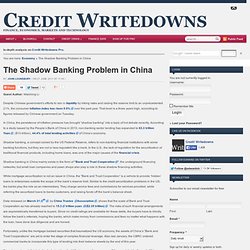
You are here: Economy » The Shadow Banking Problem in China Guest Author: Waiching Li Despite Chinese government’s efforts to rein in liquidity by hiking rates and raising the reserve limit to an unprecedented 21%, the consumer inflation index has risen 5.5% over the past year. That level is a three years high, according to figures released by Chinese government on Tuesday. In China, the persistence of inflation pressure has brought “shadow banking” into a topic of hot debate recently.
Shadow banking, a concept coined by the US Federal Reserve, refers to non-banking financial institutions with some banking functions, but they are not or less regulated like a bank. Shadow banking in China mainly exists in the form of "Bank and Trust Cooperation", the underground financing networks; but small loan companies and pawn shops also play a role in these shadow financing activities.
Related Articles.